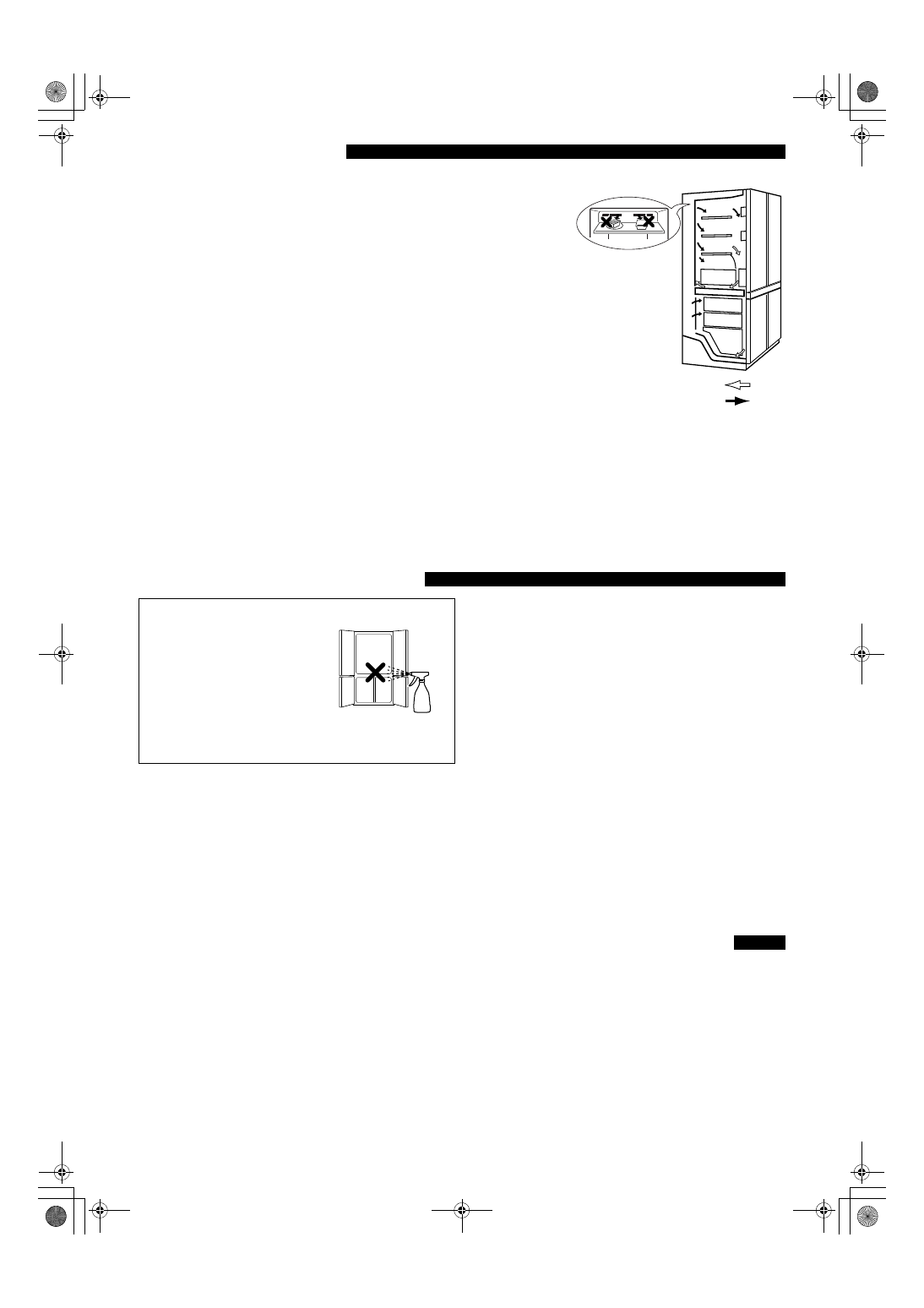
18
STORING FOOD
Refrigeration reduces the rate of food spoilage.
To maximize the shelf life of perishable food products,
ensure that the food is of the freshest possible quality.
The following is a general guide to help promote longer
food storage.
Fruit / Vegetables
To minimize moisture loss, fruit and vegetables should be
loosely enclosed in a plastic material e.g. wrap, bags
(do not seal) and place in the Vegetable crisper or the Fruit
case. Those fruits and vegetables with thick skins e.g.
oranges do not require wrapping.
Dairy Products & Eggs
•
Most dairy products have a use by date on the outer
packaging which informs the recommended temperature
and shelf life of the product.
•
Eggs should be stored in the Egg holder.
Meats / Fish / Poultry
•
Place on a plate or dish and cover with paper or plastic
wrap.
•
For larger cuts of meat, fish, or poultry, place to the rear of
the shelves.
•
Ensure all cooked food is wrapped securely or placed in
an airtight container.
NOTE:
•
Evenly place the
food on the
shelves to allow
the cooling air to
circulate
efficiently.
•
Hot foods should be cooled before
storing. Storing hot foods increases
the temperature in the unit and
increases the risk of food spoilage.
•
Do not block the outlet and inlet of
the cool air circulating circuit with
foods or containers; otherwise the
foods will not be evenly cooled
throughout the refrigerator.
•
Do not place food directly in front of cold air
outlet. This may lead to the food freezing.
FOR BEST FREEZING
•
Quality of foods should be fresh.
•
Freeze small quantities of food at a time to freeze them
quickly.
•
Food should be properly stored or covered and the air
should be removed to seal tightly.
•
Evenly place the food in the freezer.
•
Label bags or containers to keep an inventory of freezing
food.
CARE AND CLEANING
Some household cleaning chemicals may affect the
inside surfaces and plastic shelves
resulting in splitting or cracks
occurring.
When cleaning all plastic parts
inside this refrigerator, only use
diluted dishwashing liquid (soapy
water). Make sure that all plastic
parts are thoroughly rinsed with
water after cleaning.
The alkaline detergent affects on the aluminum section of
the door handle, becomes cause of tarnish.
1.
Remove the shelves and pockets from the cabinet and
door. Wash them in warm soapy dishwashing water;
rinse in clean water and dry.
2.
Clean the inside with a cloth soaked in warm soapy
dishwashing water. Then, use cold water to wipe off
soapy water.
3.
Wipe the exterior with a soft cloth each time it is soiled.
4.
Clean the Magnetic door seal with a toothbrush and
warm soapy dishwashing water.
5.
Wipe the control panel with the dry cloth.
NOTE:
•
Do not use polishing powder, benzine, hot water etc.
•
If undiluted detergent is used or soapy water is not wiped
off thoroughly, cracking of plastic parts can result.
•
Wipe any food oils adhered to plastic components as they
can cause cracking of the plastic surface.
•
The glass shelves weigh approximately 3 kg each. Hold
firmly when removing from the cabinet or carrying.
•
When dropped the juice and the like near the control
panel, wipe off directly. It becomes cause of failure of the
control panel.
When the compartment light is blown
Contact the SHARP Service Center to request a
replacement compartment bulb. The compartment bulb is
not to be removed other than by qualified service
personnel.
Switching off your refrigerator
If you switch your refrigerator off when you are going away
for an extended period, remove all food, clean the interior
thoroughly. Remove the power cord plug from the power
socket and leave all doors open.
WHAT TO DO BEFORE YOU CALL FOR SERVICE
Before you call for service, check the following points.
IT IS NORMAL
for the refrigerator to produce the following
sounds.
•
Loud noise produced by the compressor when operation
starts --- Sound becomes quieter after a while.
•
Loud noise produced once a day by the compressor
--- Operating sound produced immediately after automatic
defrost operation.
•
Sound of flowing fluid (gurgling sound, fizzing sound)
--- Sound of refrigerant flowing in pipes (sound may
become louder from time to time).
•
Cracking or crunching sound --- Sound produced by
expansion and contraction of inner walls and internal
parts during cooling.
•
Squeaking sound --- Sound produced by expansion and
contraction of internal parts.
IT IS NORMAL
that the outside of a cabinet may be hot
when touched. The hot pipe is in the cabinet in order to
prevent dew generation.
IF YOU STILL REQUIRE SERVICE
Refer to your nearest service agent approved by SHARP.
IN
OUT








































